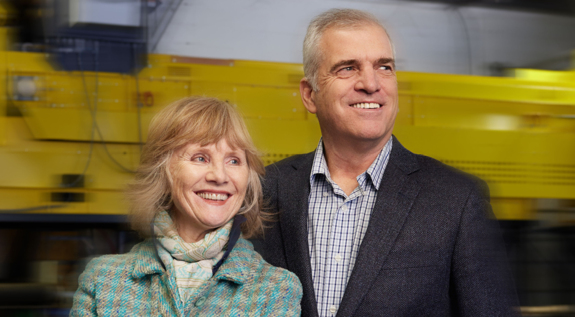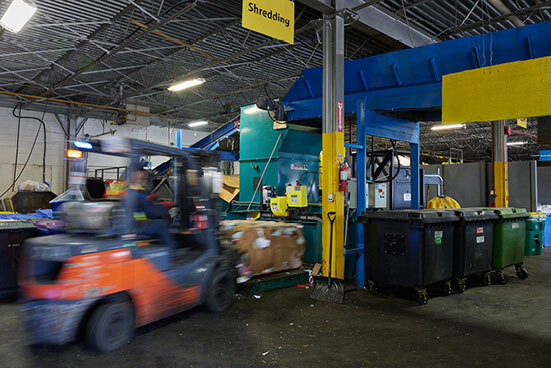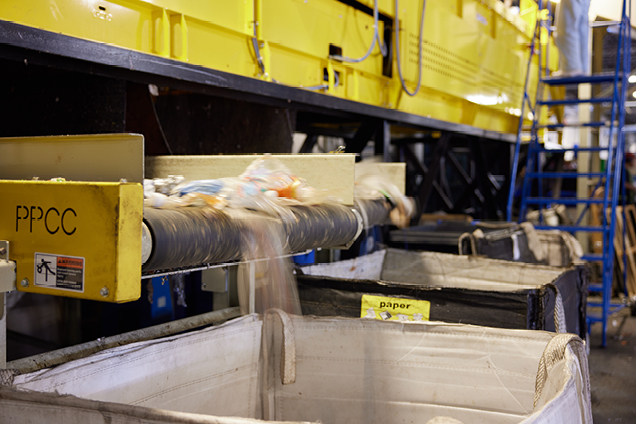Vancouver’s trash is this company’s treasure

The co-owners of a thriving sustainable waste management firm in Vancouver, B.C. are still driven by the same question that launched their corporate journey back in 1989: What happens to your stuff when you throw it away? Where is “away?”
Of course, the answer is that there is no such thing as “away”: Your discarded stuff either takes up space in a landfill or enters the world as a new product after being recycled. And that’s where Louise Schwarz and Robert Weatherbe’s company, Recycling Alternative, comes in.
These days, Recycling Alternative employs 4 dozen people and is expanding in several directions. They offer not only waste collection and recycling, but composting, shredding, consulting and site management to the industrial, commercial and institutional sectors. They focus on innovative solutions for the complex logistics and engineering required for these large operations.
For example, the partners established a 2nd company, Terraforma Systems, which designs and manufactures on-site composters that use heat, agitation and microbes to break down food waste, producing an odourless compost material. They sell or lease these units to large commercial properties, including office towers, food courts, campuses, convention centres and airports. Recycling Alternative also uses zero waste trucks, which Weatherbe designed to provide the collection of multiple sources separated recycling streams in a single pass and is researching and developing closed-loop solutions for bioplastics, through a 3rd company Regenerative Waste Labs.
Site management and consulting customers include restaurants, university campuses, shopping malls and office towers. Consulting services include waste audits, waste diversion, and waste management planning.
While the company has been, by all measures, a success, it wasn’t always smooth sailing. In the earliest days, the lack of public awareness around recycling meant devoting resources to education. Frequent regulatory changes have also created hurdles, as has competition from multinational waste operations that have been moving toward recycling.
We were galvanized by garbage and preoccupied by what people were doing with it. We realized we had to do something to help the environment.
Louise Schwarz
Co-owner, Recycling Alternative
An idealistic vision
The company’s story begins with Schwarz and Weatherbe in a hatchback, collecting discarded office paper from forward-thinking Vancouver businesses. That was almost 35 years ago—before municipal blue-box programs even existed.
Schwarz was a teacher and Weatherbe an engineer. They were inspired by a friend in Seattle who was collecting scrap paper to help the environment. “It was a wake-up call,” says Schwarz. “We were galvanized by garbage and preoccupied by what people were doing with it. We realized we had to do something to help the environment.”
The duo quickly outgrew the hatchback, graduating to a van. They built the company one truck at a time, slowly adding employees to become one of Vancouver’s leading innovators in recycling.
A key challenge at the outset was getting people to understand that there were better alternatives to throwing items away. That’s where Schwarz’s teaching background came in handy—and it still does. While both are deeply involved in the company’s operations, Schwarz gravitates toward social innovation while Weatherbe explores technological innovation.
An example of Schwarz’s community focus is the company’s collaboration with United We Can, a street charity that serves locals who earn money by recycling refundable beverage containers. United We Can is co-located with Recycling Alternative, and the two partners process some 60,000 containers daily. The proceeds are enough to support a population of 600 to 700 recycling collectors from Vancouver’s inner-city community.

Establishing Vancouver’s greenHUB
In 2014, the company achieved a significant milestone with the completion of what they call the greenHUB, a 35,000-square-foot facility. Many times the size of the company’s previous warehouse space, the greenHUB provides needed infrastructure, serves as a springboard for innovation and enables the company to bid on larger contracts.
The company’s proximity to downtown Vancouver makes it somewhat of an outlier: it’s unusual to find a facility of this type and size outside of suburban industrial parks. But Recycling Alternative is located in the False Creek Flats, a little more than a kilometre from downtown Vancouver, one of the city’s busiest urban areas, with tourist attractions, pubs, coffee shops, restaurants and a seawall.
Our location is key, says Schwarz. “We wouldn’t gain much in terms of environmental impact if we had to drive two or three hours to deliver materials to our facility.”
The business model is fairly straightforward—Recycling Alternative charges fees for its various services. Large commercial properties, businesses and events that are not served by municipal garbage collection are required to contract a firm to provide them. Recycled materials themselves also have value, allowing the company to earn additional revenue from brokering raw materials.
BDC understands our finances and stability, and they’re willing to support us. That familiarity and trust have been some of the best benefits to us in our growth.
Robert Weatherbe
Co-owner, Recycling Alternative
A growth strategy
These days, Schwarz describes herself and Weatherbe as “tip to tail trash people innovating around waste.” As the company grows, a key challenge is financing the equipment and resources it needs, such as the trucks that are priced in the six figures.
That’s where BDC comes in.
BDC first got involved a dozen years ago when the company was looking to expand its fleet. More recently, Recycling Alternative has sought financing for infrastructure and technology investments, including an optical sorter, which it needs to scale up its processing. Optical sorters can cost upwards of $500,0000.
Weatherbe appreciates BDC recognizing his and Schwarz’s expertise.
“They realize we know what we’re doing,” he says. “They understand our finances and our stability, and they’re willing to support us. That familiarity and trust have been some of the best benefits to us in our growth, and we look forward to continuing that relationship.”

Contributing to the circular economy
Schwarz and Weatherbe are proud contributors to the circular economy.
“We believe in what we call the chain of custody—following the materials, understanding where they’re going,” says Schwarz. “Recycling is intrinsically part of a circular economy because it’s about making something new from what you don’t need anymore.”
For example, Terraforma Systems’ on-site composters turn waste into a nutrient-rich soil. That means food waste at a hotel or shopping mall can be processed on site and recovered for use on a rooftop garden.
“We’re part of a movement where materials are not leaving the area where they were generated,” she adds. “They’re being processed or reconstructed and put back into circulation.”
To give back, collaborate
The co-owners say other companies looking to create better outcomes for society and the environment can focus on collaboration.
“It’s about understanding your business model and knowing where there are opportunities for other people to portal into that,” she says.
“For example, we work with groups in the Downtown Eastside that focus on inclusive employment. It’s about knowing your local ecosystem, understanding who’s working, building relationships and creating that critical mass together. It’s about SMEs coming together to create an equitable and resilient local economy.”
Next step
Learn what you can do to reduce the amount of organic waste you send to landfills.